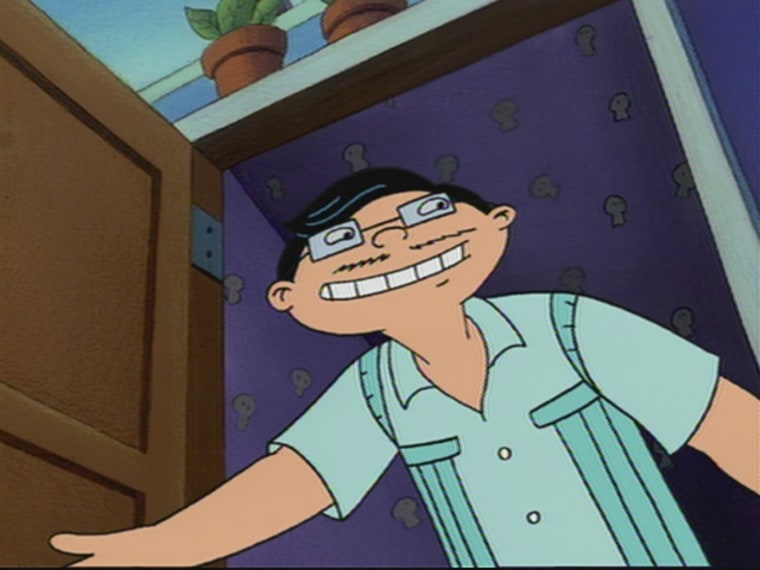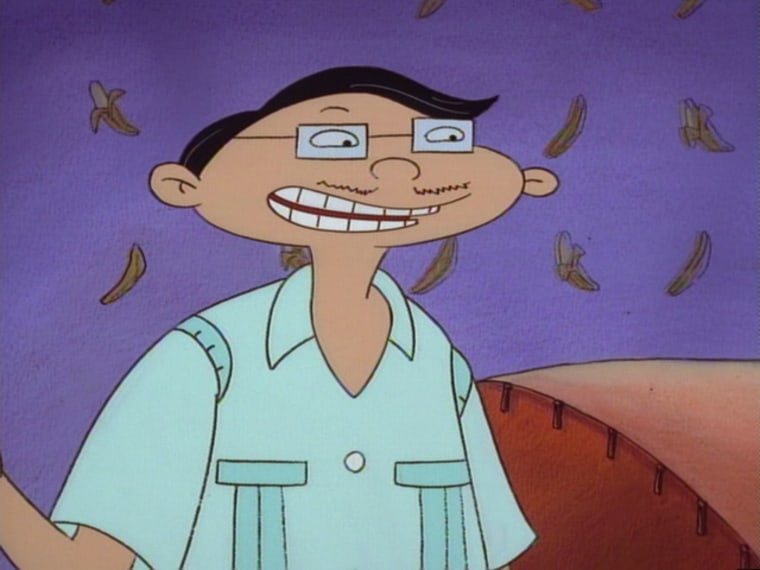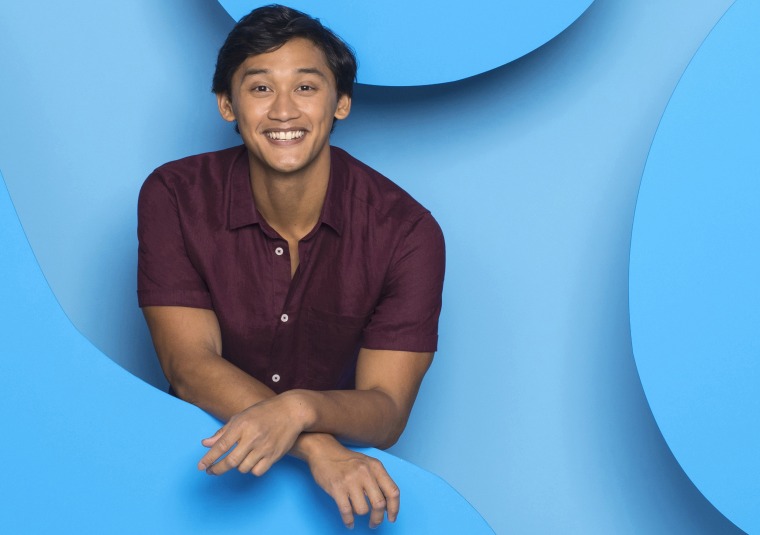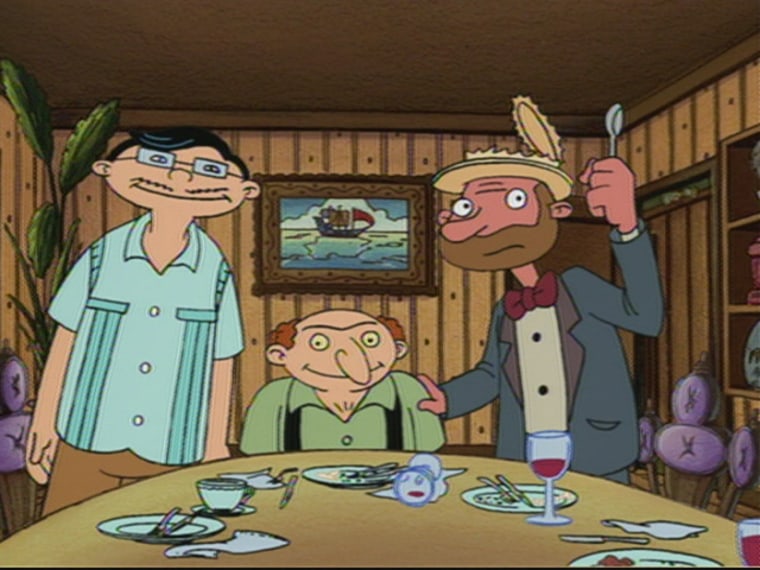When Craig Bartlett developed “Hey Arnold!” in the early ‘90s, he wanted to make a show that reflected Los Angeles — the diverse city he lived in — and that kids could relate to.
That meant centering the show on the everyday problems of “football-headed” 9-year-old Arnold and his diverse group of friends in the fictional city of Hillwood. To add authenticity, Bartlett added, they made sure to cast actual children to do the kid characters voices.
“I always felt that when kids watch a cartoon show, these are their virtual friends so this was always the goal,” Bartlett said. “I wanted Arnold’s neighborhood and school to be ethnically diverse and that we don’t make a big deal about it. It was just natural, and that’s how I decided to play it.”
The show featured some of the first Asian-American characters in Nicktoons history — Phoebe Heyerdahl — the biracial Japanese-American girl who was part of Arnold’s group of friends; her father, Kyo Heyerdahl, voiced by George Takei; and Mr. Hyunh, one of the residents at Sunset Arms, Arnold’s grandparents’ boarding house.
In the first season of “Hey Arnold!,” Nickelodeon aired an episode titled “Arnold’s Christmas” which delved into the history of Mr. Hyunh and how he was separated from his young daughter, Mai, in Vietnam during the fall of Saigon. The episode features the two characters reuniting years later, on the titular holiday.
For many emerging actors, seeing characters on shows like “Hey Arnold!” that represented their backgrounds made an impact.
On Twitter last year, New York-based actor Julian Hermano wrote about how the episode was one of the first shows that explored Asian-American representation and tackled war and separation.
“I liked that the episode wasn’t afraid to depict war and the effects it had on families,” Hermano told NBC News. “It didn’t dig too much into the history, which might’ve been too politically charged or sophisticated for the average child, but it didn’t shy away from the fact that Mr. Hyunh acknowledged that his country was in danger and wanted to send his daughter to America to live a better life.”
Bartlett said the network was originally hesitant to greenlight the episode when Steve Viksten — the writer who wrote and pitched the episode — brought the idea up to Nickelodeon, thinking it would be too heavy for a children’s show.
But Viksten and Bartlett pushed for the episode, Barlett said, noting that Baoan Coleman, the Vietnamese-American voice actor who voiced Mr. Hyunh, experienced the Fall of Saigon first hand. They wanted audiences — parents and children alike — to see not only Mr. Hyunh’s back story, but the real one of the man who voiced him.
Sal Mattos, a San Francisco-based actor and writer, said Nickelodeon was the main network he grew up on. He added that he appreciated how Mr. Hyunh on “Hey Arnold!” wasn’t portrayed as stereotypical and that the character always reminded him of real, older Asian men he knew in his life, such as his grandfather-in-law.
“Mr. Hyunh had a thick accent, but nobody on the show ever made fun of it and it was never a source of humor,” Mattos said.

Mattos added he resonated with “Hey Arnold!” because it focused on growing up in an urban environment, describing it as “in your face and gritty” despite being a children’s show.
“I definitely liked seeing a show that had a diverse cast, not just racially, but had all kinds of different body types explored, different levels of economic class and a clearly coded gay character in one of the teachers, which I always appreciated being queer myself,” he said.
“We wanted to make him gay, but didn’t want to point it out or make it the focal point,” Bartlett said, referring to the character of Mr. Simmons. “He’s a person whose caring and passionate about his students and teaching. Dan Butler portrayed the character with that energy in saying that everyone is special in their own way.”
Diversity in the '90s
“Rugrats” is another show Mattos remembers fondly in terms of having a diverse cast (Kimi Finister — who first appeared in the “Rugrats in Paris” movie with her mother, Kira Watanabe-Finster — are Asian American) and exploring deeper issues like death and grief.
Hermano and Mattos both noted that Nickelodeon’s “Avatar: The Last Airbender” also explored various themes and showcased diverse representation. Mattos credited the show’s exploration of spirituality, war and imperialism.
“It explored the concepts in a very kid-friendly way,” Mattos said. “And it had a very diverse cast, which was all Asian and brown people so that was a first for me.”
Hermano said that while he thinks we’re entering a more culturally aware period in the present, he feels like some people still dismiss media for children or young adults as mindless entertainment.
“These are the things we’re going to be watching and digesting during our formative years, which is why so much of it is about friendships, family and unity,” Hermano said. “But as you age up, you get into ‘Hey Arnold!,’ which can be enjoyed by kids as well as teenagers and it’s important to introduce concepts like the aftermath of separation or what it’s like being ethnically different from the rest of your community.”
Modern TV
Julie Rose, the vice president of talent and casting at Nickelodeon, said the network has a history of “putting kids first” in live action and animation, citing hiring writers and crew members from different backgrounds and the network’s female leads like Miranda Cosgrove in “iCarly.”
She added that Nickelodeon looks at extensive research to inform their talent and programming and the preparation that goes into making their shows.

“Those studies tell us that kids really want to see themselves reflected on screens and we do just that,” Rose said. “We spend a lot of time developing our kids through different workshops and mentoring programs, and partner with some of the best with Second City and The Groundlings in Los Angeles and Chicago to grow and foster talent.”
“It’s all about finding authentic kids and talent for our audience to succeed on air,” she added.
In September, the network announced it was reviving it’s classic ‘90s show “Blue’s Clues,” — this time titled “Blue’s Clues & You” with actor Joshua Dela Cruz as host. Dela Cruz, who is Filipino American, was formerly in the Broadway production of “Aladdin,” and Rose said and her team searched for more than 3 months and saw about 3,000 actors for the role.

Dela Cruz said that while he wasn’t the target audience for “Blue’s Clues” growing up, he watched the show with his younger sister. To be cast in the revival, he said, is a dream.
“Everytime Steve was doing the ‘Mailtime’ song, I thought he was doing a baritone impression of an opera singer, and I always associated that with the show, and music, even up until I was in college,” Dela Cruz said.
He said he feels that it is important for children to not only see people that look like them on television but all different types of people.
“I think the more we see true diversity on screen, the more we’ll able to relate to one another,” Dela Cruz said. “A big part of watching television growing up is feeling alienated, like, I was watching someone else’s story. The more these outlets became inclusive, I suddenly felt like it wasn’t just their story, it was my story too so it helped me to be more understanding.”
Like Hermano and Mattos, Dela Cruz said “Hey Arnold” had an effect on him growing up. Mr. Hyunh is one of the first Asian characters he remembers seeing.
“He’s a Vietnamese immigrant living in a city where he was the only Asian in the house,” Dela Cruz said. “In one episode, Mr. Hyunh sings country music and is transformed whenever he’s on stage and even finds success. He wasn’t just an Asian immigrant, but somebody who connected to Americans.’”
Bartlett, the “Hey Arnold!” creator, said he receives messages on Instagram from adults who grew up in the ‘90s watching his show, including a recent one from a Vietnamese-American woman who said she appreciated him for representing her culture.
“When kids who grew up and have gone to college can tell me eloquently as adults that this show had such a huge impact on them,” Bartlett said. “I can’t think of anything more gratifying than to find out that our goals we set out really happened.”
Follow NBC Asian America on Facebook, Twitter, Instagram or Tumblr.


